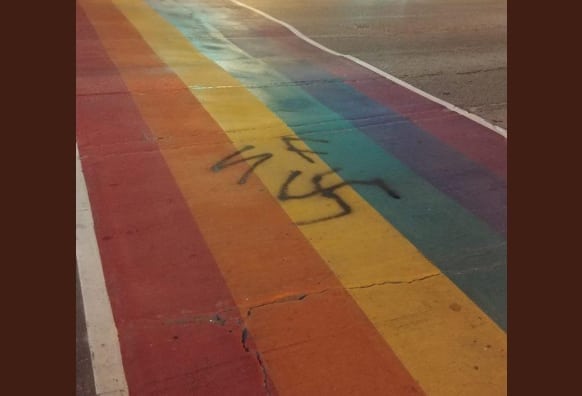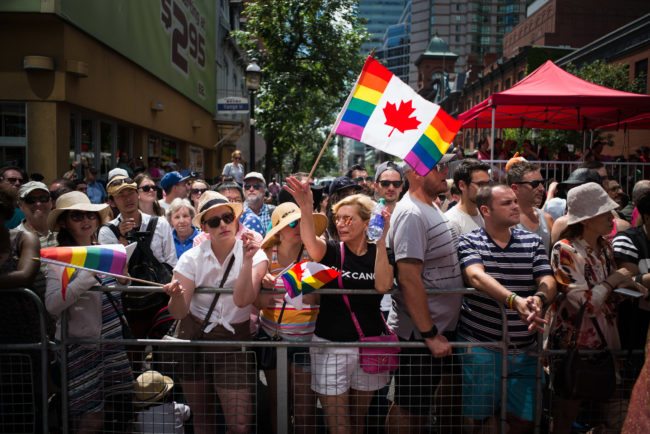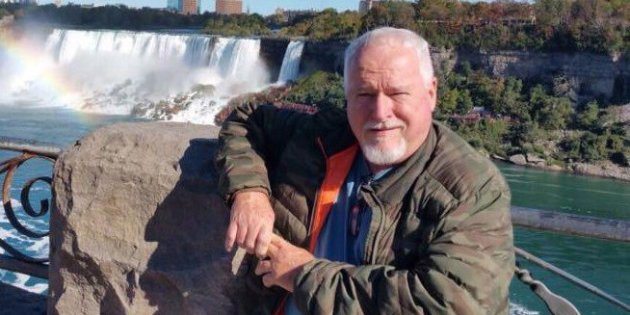Swastika painted on rainbow walkway in Toronto’s Gay Village

Police are investigating a swastika found painted onto a rainbow walkway in Toronto’s Gay Village neighbourhood.
Officers posted a photo of the graffiti on Twitter and called for witnesses who may have seen the culprits to come forward.
“Yesterday a hate crime was committed right in the open in the @ChurchWellesley neighbourhood,” the post read.
“If you saw this swastika being painted at Church/Alexander St please contact @TPS51Div station & refer to occurrence #1423067/18.”
The graffiti was discovered and removed by members of the local community from the Church-Wellesley Neighbourhood Association.
The authorities are looking for two people who “deliberately” tried to “conceal their identity” in relation to the graffiti, the Toronto police force’s LGBT+ liaison wrote on Twitter.

Toronto’s annual Pride parade (Ian Willms/Getty Images)
Data released this year by the Toronto Police Hate Crimes Unit showed the number of reported hate crimes rose by 28 percent in 2017 in the city, compared to the previous year.
In total,186 hate crimes were recorded, with vandalism and graffiti common crimes, CBC reported.
The research showed LGBT+ and Muslim community members were most likely to be assaulted.
As part of our continuing efforts to fight Hate Crime in the #ChurchWellesley village you will see these posters going up tonight in the area- HATE IS A CRIME, BEING HUMAN ISN’T. LGBTQ HATE CRIME. STOP IT! REPORT IT! Thx to @ChurchWellesley BIA for distribution. #FightHateCrime pic.twitter.com/5jLVWw4pC8
— TPS LGBTQ-ISN (@TDotGayCops) August 3, 2018
At this year’s Toronto Pride, a moment of silence was held for the victims of the alleged serial killer Bruce McArthur, who has been charged with the murders of eight men, who all had ties to Toronto’s Gay Village.
Pride participants wore black T-shirts that read “we will not rest until we’re safe”, in protest of the slow pace of the investigation into the deaths of the victims McArthur is accused of killing.
The community has also expressed frustration with the lack of communication with LGBT+ people prior to and during the enquiry.
“As recently as last December we were being told by Chief Saunders that our longstanding concerns about a serial killer preying on our community were not based on any evidence,” Douglas Elliott, a lawyer and community member said at a press conference. “He was wrong.”

Bruce McArthur is charged with killing eight men linked to Toronto’s Gay Village
Last month, police discovered more human remains at a site where McArthur used to work.
Police have searched around 100 properties with connections to McArthur’s landscaping business.
Detective Sergeant Hank Idsinga, who is leading the case, told CBC: “We haven’t identified what the remains are or who they belonged to.”
He said that the latest remains could be of the deceased men, whose bodies have already been partially recovered.
Idsinga added that the identification process for the remains could take “days, weeks or months.”

